Replay: Pharaoh
by Lorna
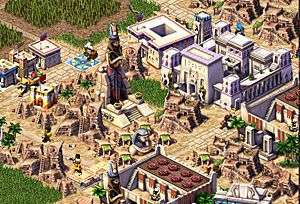 Not long after re-installing Pharaoh after an absence of over five years did I remember exactly why I had abandoned it. It’s hard. It has the kind of difficulty that creeps up on you early on and whacks you around the head with a canopic jar, and while it is a very enjoyable game, if you get on its wrong side, it’s as much fun as a cursed cup of PG. Created by Impressions Games and released back in 1999 by Sierra – known for their historical city building/simulation titles – Pharaoh was sandwiched between the Caesar games and the Greek-themed Zeus. Back then Pharaoh was well received, scoring highly across many major publications, and deservedly so.
Not long after re-installing Pharaoh after an absence of over five years did I remember exactly why I had abandoned it. It’s hard. It has the kind of difficulty that creeps up on you early on and whacks you around the head with a canopic jar, and while it is a very enjoyable game, if you get on its wrong side, it’s as much fun as a cursed cup of PG. Created by Impressions Games and released back in 1999 by Sierra – known for their historical city building/simulation titles – Pharaoh was sandwiched between the Caesar games and the Greek-themed Zeus. Back then Pharaoh was well received, scoring highly across many major publications, and deservedly so.
It is an aesthetically pleasing isometric game, easy to pick up, and absorbing to play as you begin the seemingly achievable task of building an enduring dynasty, constructing and managing increasingly complex cities and economic infrastructures in order to progress. On papyrus, that’s all well and good. In reality, things are somewhat different, as I found out back then, and again, recently. Resource management games always have a blade and half a dozen aces up their sleeves, but the ferocity with which they take you down is often unexpected.
Very quickly Pharaoh throws you into juggling multiple resource chains, with building after building added to your list and no end in sight. People need food from bazaars, which comes from farms. Farms need granaries to store food, and storage yards to hold barley in order for your brewers to produce beer. Your brewers also need pottery, which is produced by your potters, who need clay, which has to come from your clay pits. Deep breath – this is just the start.
Amongst all the resource buildings are equally essential amenities … and if you miss or neglect any of them, punishment comes on swift wings. Without an architect’s post your buildings will, without warning, collapse into rubble. In the split seconds before you notice or can locate and react to said collapse, your dickish nearby residents will decide that the heap of rubble nearby that was formerly something useful, like a firehouse, is pulling down the tone of the neighbourhood and your houses in that vicinity will downgrade. Big deal? Yes, actually, as that means that they drop a level in both fanciness and space, leaving people homeless and on the street clutching, of all things, a carpet.
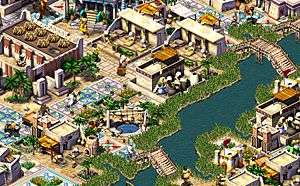 People near those houses then decide that they don’t like the (now) inferior buildings adjacent to them and they downgrade, sending more people and their homeless carpets flooding onto the streets. Meanwhile, since your firehouse is currently rubble your apothecary decides to spontaneously combust, taking with it a full granary next door, complete with this season’s harvest, and the local police station for good measure. Now your citizens will have less food, more crime, and the money you’ll spend sorting the whole mess out will see you in the red and your Pharaoh distinctly unimpressed.
People near those houses then decide that they don’t like the (now) inferior buildings adjacent to them and they downgrade, sending more people and their homeless carpets flooding onto the streets. Meanwhile, since your firehouse is currently rubble your apothecary decides to spontaneously combust, taking with it a full granary next door, complete with this season’s harvest, and the local police station for good measure. Now your citizens will have less food, more crime, and the money you’ll spend sorting the whole mess out will see you in the red and your Pharaoh distinctly unimpressed.
While this is going on, citizens and carpets are spilling from homes, and the Gods are pissed off because you haven’t remembered to throw them a debauched, beer-soaked party – sorry ‘festival‘ – in the last five minutes, and the Pharaoh has decided that your lack of effort in supplying him some colourful pottery amidst this chaos is reason enough to send in the troops for some ancient ultraviolence. And your troops can’t beat his. See what corpses do to your fucking property value. Or the carpets for that matter. It’ll take more than a handful of potpourri, a few paved roads, and pretty statues dumped in some gardens to sort out that melting pot of trouble. It’s stuff like this that has caused my laptop to cruise dangerously close to hitting a wall at times.
Like any game of this nature, the art is in the juggling, and while it is obvious and expected that one weak link can have a troublesome knock-on effect, Pharaoh‘s balance seems (to the beleaguered player, at least) to lie somewhere between spider web and fairy hair. It could do with being a teeny bit less sensitive. And bastardly. For example, I wasn’t long into the game before it taught me about firehouses… by letting my mine – my only mine – burn down. At this point in my replay it didn’t take long for me to remember just how fractious my relationship with the game was, and I began to fear that my laptop would eventually take out a restraining order against me before I ever finished the game.
Pharaoh‘s habit of throwing new and important buildings at you when your city centre is full to bursting is frustrating at times – it means that the best city is one started again, armed with foreknowledge of everything required in order for you to properly plan layout. People like me who gallop through the kingdom, chucking down houses and temples like a drunk god don’t tend to fare well. Testing the waters and restarting with a grand plan in mind is often the best way to beat some of the later levels – especially when it comes to the Pharaoh’s demands – the hair-trigger temper of a Pharaoh later on, coupled with his laundry list of demands, made continuing impossible for me many years ago, mainly because my city had been razed by his unbeatable troops. Almost as bad, perhaps, is the ridiculous struggle to drag reputation up when you’ve lost it – it’s an excruciatingly long process that has seen me nearly shed hours of progress and restart.
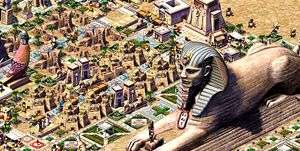 But believe it or not, though, Pharaoh is enjoyable (honestly!), for all its stresses and faults. It’s utterly absorbing and the constant tweaking, building, and juggling is genuinely compelling – especially when it goes to plan. Even the most persistent frustrations can melt away when things finally run smoothly for a while and you get to the point where you can finally starting raising the enduring, iconic structures that made (and continue to make) the Egyptian era so intriguing.
But believe it or not, though, Pharaoh is enjoyable (honestly!), for all its stresses and faults. It’s utterly absorbing and the constant tweaking, building, and juggling is genuinely compelling – especially when it goes to plan. Even the most persistent frustrations can melt away when things finally run smoothly for a while and you get to the point where you can finally starting raising the enduring, iconic structures that made (and continue to make) the Egyptian era so intriguing.
Despite hating your guts and punishing you with some nasty turns in gameplay, Pharaoh is a damn good game that has held up surprisingly well, and I’d recommend it to anyone with even a passing interest in the genre. It has never left my gaming library and likely never will. With ancient classical civilisations seemingly absent from all but match-three games these days, Pharaoh is a fine fix for strategy-management masochists everywhere… even if the game should have come with a side-order of vallium.
Last five articles by Lorna
- Flagging Heart
- Where Have All the Hours Gone?
- I Heart... Overlord
- Life Goes On: Done to Death - Review
- Welcome to Spoilerville, Please Despise Your Stay














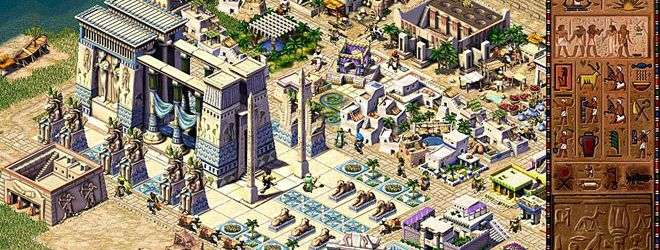
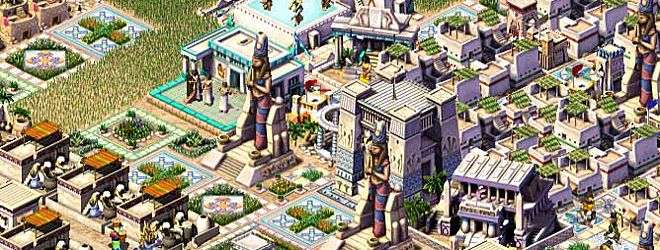





I actually was playing this not too long ago. Well, this a bit and then I remembered I enjoyed Zeus more and downloaded that instead. There’s something magical about both games though, and I’ll never forget the wonderfully enjoyable struggles I had trying to build a shrine to Bath. Or Bat. Whichever one the cat god is. Wonderful games though. And wonderful article.
Thanks, Keegan. I do love to hate it and have always ended up re-installing it on whatever PC pr laptop I end up with. Have tried Caesar but never Zeus – I’ll have to pick it up on GOG